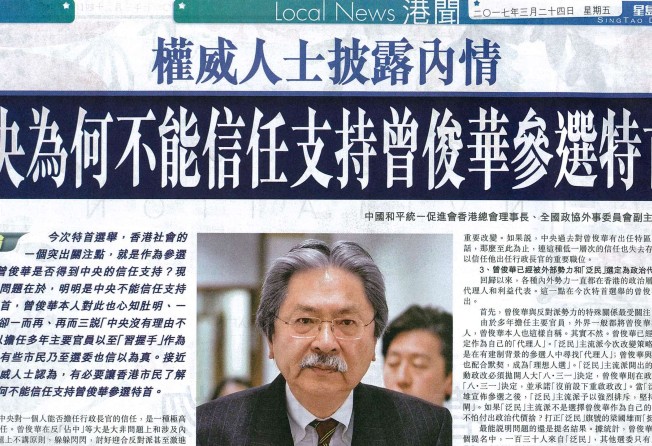Beijing ‘doesn’t trust John Tsang because he ignored its warning not to run’ in Hong Kong chief executive election
Veteran leftist claims in newspaper article that Tsang is ‘an agent of pan-democrats’ with US backing

A veteran leftist has hit out at chief executive candidate John Tsang Chun-wah, saying Beijing doesn’t trust him because he ignored its warning against joining the race, and lacked commitment in opposing 2014’s Occupy protests.
Lo Man-tuen, who sits on the board of the campaign of Tsang’s rival Carrie Lam Cheng Yuet-ngor, also accused the former financial secretary of being “an agent of pan-democrats” and backed by the United States.
Chief Executive Leung Chun-ying joined in. In a veiled reference, he slammed his former subordinate’s lack of concrete plans on housing, and queried why pan-democrats did not vote for Leung himself five years ago if they only wanted someone popular in opinion polls.
Late in the 2012 race, Leung had led Henry Tang Ying-yen in most opinion polls. He eventually won, but without pan-democrat support.
Two days before the election Lo, vice-chairman of the Chinese People’s Political Consultative Conference’s (CPPCC) subcommittee on foreign affairs, wrote a 6,800-word article in the Chinese-language newspaper Sing Tao Daily, titled: “Authoritative source reveals why Tsang is not supported by the central government”.
Citing his source, the veteran leftist wrote that Tsang’s first problem was his “lack of principle on major issues” – the pro-democracy Occupy protests and last year’s Mong Kok riot – along with his “laid-back” working style, remaining silent in cabinet meetings and focusing on drawing pictures in his notebook.
He said Tsang failed to join the chief executive and other officials in a signature campaign against the mass pro-democracy sit-ins, that “challenged Beijing’s authority”. He noted Tsang even expressed appreciation for the local film Ten Years,which was considered a smear on “one country, two systems”.
The second problem, Lo said, was that “Tsang has become a political figure that runs counter to the central government”, as he had chosen to ignore signals from Beijing against his running for the top job.
Lo claimed the third problem was Tsang’s relationship with the pan-democrats and the United States.
“Tsang got most of his nominations from the democratic camp; for sure he was the agent of the interest of pan-democrats,” he wrote.
Lo also claimed it was “an open secret” that Tsang got US backing. As evidence he cited Tsang’s support from former chief secretary Anson Chan Fang On-sang and Democratic Party founding chairman Martin Lee Chu-ming, both of whom Beijing loyalists see as US-friendly.
In response, Tsang said he was not surprised by the attack, which he said was part of his rivals’ electioneering.
“They have to make sure their preferred candidate would gain the majority support… I am only surprised it has come so late,” he said.
“Election Committee members should have their own views and wisdom to analyse. I will respect the decision made by all election committee members.”
Meanwhile the chief executive, recently elevated to vice-chairmanship of the CPPCC, gave a long reply to a reporter’s question about the candidates as he left the city for the Boao Forum, a trade conference on the mainland.
“My experience is the head of the government does not only have to have a good intention,” Leung said. “He or she needs a concrete vision and policy blueprint.”
He gave the example of housing policy, saying a candidate should not only have the “vision” of housing 60 per cent of the population in public flats – as Tsang pledged in his manifesto – but should also provide a timetable and proposed measures.
Leung also queried the decision of about 300 pan-democratic Election Committee members to vote for Tsang on Sunday, saying they should not just focus on his high ratings in polls.
“I was the most popular among the three candidates in the last election, but the pan-democrats didn’t vote for me… Why were they not all in for me five years ago? They should explain.”